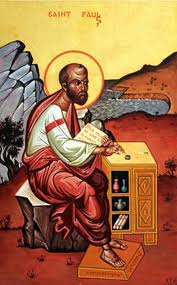|
|||
|---|---|---|---|
| This weekly bulletin insert complements the curriculum published by the Department of Christian Education of the Orthodox Church in America. This and many other Christian Education resources are available at http://dce.oca.org. | |||

The entire twenty-seventh chapter of the Book of Acts describes Saint Paul's final sea journey, from Caesarea to Rome. We're immediately reminded of the hazards Paul faced in his travels. Before we even get to verse 5, Luke tells us twice that "the winds were against us." The voyage to Rome would continue to be full of danger and hardship. But in the previous chapter, the twenty-sixth, Paul has faced something perhaps harder to bear: total indifference to the Gospel. The chapter describes Paul, a bound prisoner, making his defense before Herod Agrippa II, the son of Herod Agrippa I who had "laid violent hands" on Christians. Paul begins his defense with hope that Agrippa will be a fair judge because he is "especially familiar with all customs and controversies of the Jews" (26:3). Paul has already been interrogated by Festus, the Roman governor of Judea who is also present. Paul doesn't expect much from Festus, a pagan and probably unfamiliar with the Old Testament prophecies and their completion in Jesus. But from Agrippa, a Jew, Paul hopes for more. So he addresses a majestic explanation of the Christian faith to Agrippa as a fellow Jew, basing it on the Old Testament expectations. He speaks of the "promises made by God to our fathers, to which our twelve tribes hope to attain." He expresses incredulity that he should be accused by Jews for holding to that hope. Then he asks, "Why is it thought incredible by any of you [Jews who know the Old Testament prophecies] that God raises the dead?" (26:8). Paul also testifies about his experience on the road to Damascus, when he saw a heavenly light "brighter than the sun, shining round me and those who journeyed with me." He describes a voice—in Hebrew—identifying Jesus as Lord and calling him to bear witness to Jesus Christ so that people can "turn from darkness to light and from the power of Satan to God" (26:18).
We might expect that there would be at least a brief thoughtful silence in response to such a stirring message. But Festus can hardly wait to say loudly, "Paul, you are mad, your great learning has made you mad." Paul calmly denies this, but challenges Agrippa, again as a fellow Jew: "King Agrippa, do you believe the prophets? I know that you believe." Agrippa answers, "In a short time you think to make me a Christian!" His only reaction to Paul's fiery faith is a lame half-joke. Paul must have been deeply disappointed. He must also have been sorry for this lost soul, the last of the Herods, who reacts with indifference to the offer of life. |
|||
